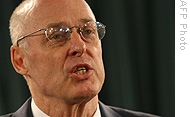voa标准英语2008年-US Treasury Secretary Defends Bailout, Calls fo(在线收听)
 |
| US Treasury Secretary Henry Paulson (file photo) |
Paulson said the current financial crisis had many causes, including government inaction and mistaken actions, outdated U.S. and global regulatory systems, and too much risk-taking by financial institutions. He says his first priority has been to stabilize the system. He says the next will be to reform it.
"This debate offers great opportunities and great peril. The events of the last year have exposed excesses and flaws that are, to put it mildly, humbling. If we do not correctly diagnose the causes and instead act in haste and implement more rather than better regulations, we can do long-term harm," he said.
Paulson says recovery will take time, and a new regulatory framework cannot be developed while the financial situation is unfolding.
The treasury secretary faced sharp criticism over his handling of the bailout when he appeared Tuesday before the House of Representative Financial Services Committee. The $700 billion escue plan initially focused on buying bad debt from banks that were left with nearly worthless securities after the housing market collapsed. Paulson said a worsening situation called for a change of strategy, and he started making cash infusions into financial companies, with the government taking an equity share, in order to get the institutions lending again.
He says international bodies such as the World Bank, International Monetary Fund, and regional development banks should reform their governing boards to make them more accountable, streamlined and effective.
"Similarly, the IMF and the World Bank need to accord dynamic emerging market economies greater representation and participation in their daily operations," he said.
Paulson urged cooperation among Democrats and Republicans in Congress and among world leaders, as they work through the crisis. He says future reforms must be consistent with free trade and open investment.